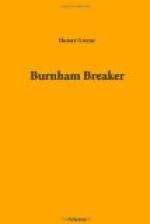And, indeed, this was her impulse and inclination, but Goodlaw, in whose wisdom she put much confidence, had advised her not to be in haste. They had had a long consultation after the adjournment of court on Saturday evening, and had agreed that the evidence pointed, almost conclusively, to the fact that Ralph was Mrs. Burnham’s son. But the lawyer said that the only safe way was to wait until the verdict of the jury should fix the status of the boy beyond question. It would be but a day or two at the most.
Then Ralph might be taken by his mother, and proceedings could be at once begun to have Simon Craft dismissed from the post of guardian. Indeed, it had been with this end in view that Goodlaw had made his cross-examination of Craft so thorough and severe. He had shown, as he intended to, from the man’s own lips that he was unfit to have possession either of the child or of his property.
This danger was now making itself more and more apparent to Sharpman. In the excitement of the trial, he had not fully realized the probable effect which the testimony elicited from his client by the opposing counsel might have.
Now he saw what it could lead to; but he had sufficient confidence in himself to believe that, in the time before action in that phase of the case should become necessary, he could perfect a plan by which to avert disaster. The first and best thing to be done, however, under any circumstances, was to keep the confidence and friendship of Ralph. With this thought in mind, he occupied a seat with the boy as they rode up from Wilkesbarre on the train that night, and kept him interested and amused until they reached the station at Scranton.
He said to him that he, Sharpman, should go down to Wilkesbarre early on Monday morning, and that, as it might be necessary to see Ralph before going, the boy had better call at his office for a few moments on Sunday evening. Ralph promised to do so, and, with a cordial handshake, the lawyer hurried away.
It is seldom that the probable outcome of a suit at law gives so great satisfaction to all the parties concerned in it as this had done. Simon Craft was jubilant. At last his watching and waiting, his hoping and scheming, were about to be rewarded. It came in the evening of his life to be sure, but—better late than never. He had remained in Wilkesbarre Saturday night. He thought it useless to go up to Scranton simply to come back again on Monday morning. He spent the entire day on Sunday planning for the investment of the money he should receive, counting it over and over again in anticipation, chuckling with true miserly glee at the prospect of coming wealth.
But Ralph was the happiest one of all. He knew that on the coming Monday the jury would declare him to be Robert Burnham’s son.
After that, there would be nothing to prevent his mother from taking him to her home, and that she would do so there was no longer any doubt. When he awoke Sunday morning and thought it all over, it seemed to him that he had never been so near to perfect happiness in all his life before.




